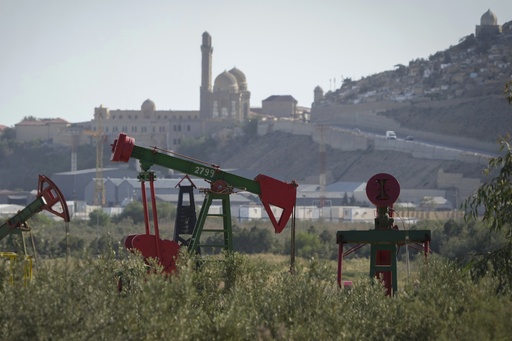
Azerbaijan is in the spotlight as it prepares to host the United Nations’ significant climate conference, COP29, in its capital city, Baku. This annual summit will bring diplomats from around the globe to engage in discussions on combatting the escalating threats posed by climate change in a region historically tied to the oil industry. Baku was where the first oil fields were established back in 1846, and the country was a global leader in oil production by 1899.
Situated alongside the Caspian Sea and bordered by Iran and Russia, Azerbaijan was a part of the Soviet Union from 1922 until it gained independence in 1991. The nation heavily relies on the export of oil and gas, which are significant contributors to carbon dioxide emissions responsible for climate change. President Ilham Aliyev has referred to these resources as a “gift of the gods,” reflecting the nation’s deep reliance on fossil fuels. As an authoritarian ruler with more than two decades in power, Aliyev’s government has been criticized for restricting freedom of speech and suppressing civil rights. Notably, media reports have indicated the Azerbaijani government denied access to journalists before the conference.
Aliyev expressed pride in hosting COP29, viewing it as a recognition of the country’s role in green energy initiatives. He has suggested that enhancing domestic renewable energy sources would allow Azerbaijan to ramp up its oil and gas exports. Everywhere in Baku, the signs of a fossil fuel-centric economy are visible, with pumpjacks extracting significant amounts of oil daily. Not far from one of Baku’s well-known religious landmarks, the Bibi Heybat mosque, oil extraction continues unabated.
The president views hosting the climate summit as a mark of respect from the international community toward Azerbaijan’s efforts in transitioning to green energy. Future initiatives include investments in hydropower and solar energy projects in the contested region of Karabakh, where many ethnic Armenians have relocated following a recent military conflict. In a statement, Aliyev emphasized the paradox of modern development, noting that the world cannot overlook the necessity of fossil fuels for the foreseeable future during its transition.
Conference president Mukhtar Babayev, who serves as Azerbaijan’s environment minister and is a former executive at the state oil company Socar, aims to demonstrate how a country with deep fossil fuel roots can pivot toward renewable energy. He reiterated Azerbaijan’s commitment to follow up on agreements made in the prior years to reduce dependency on fossil fuels, aiming for collaboration at the next summit in 2025 that will finance strategies for decreasing greenhouse gas emissions.
Yet, skepticism looms over these pledges. Critics from various organizations argue that Azerbaijan’s green energy commitments equate to superficial promises, often termed “greenwashing.” While nations like the U.S. and the UAE are actively addressing their fossil fuel issues, Azerbaijan is accused of lagging behind in making substantial changes, according to experts monitoring environmental practices in the region.
Human rights advocates have also highlighted the dangerous environment for those who attempt to monitor pollution and industrial impacts, calling attention to chronic health issues stemming from the oil and gas sectors. Residents near significant extraction sites, such as the Sangachal terminal, reportedly suffer from health-related complaints that often go unaddressed due to the government’s strict control over civil society.
Despite claims made by the environment minister regarding rising temperatures and a need for better emission-control strategies, Azerbaijan faces critiques for its ongoing emissions from flaring at oil and gas facilities, which has reportedly increased since 2018. This practice is a source of harmful pollutants contributing to global warming and has been linked to various health concerns among local communities.
As Azerbaijan boosts its natural gas production, particularly in the wake of decreased Russian supplies to Europe following the Ukraine invasion, its geopolitical importance has risen. This rapid increase in fossil fuel production includes major projects like the Shah Deniz gas field and new offshore drilling operations. The European Union has even established agreements to enhance Azerbaijani gas imports, scheduling significant increases in supply to meet growing energy demands.
In light of these developments, Azerbaijan’s role as COP host raises pressing questions about its commitment to a sustainable energy future amidst its heavy reliance on fossil fuel revenues. For many analysts and climate experts, the effectiveness of these discussions may hinge on Azerbaijan’s historical relationship with the fossil fuel sector and whether it can truly embrace a future focused on renewable energy.
